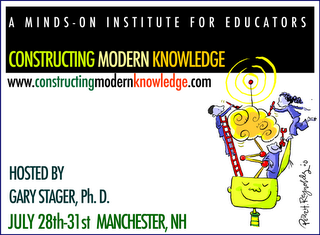Announcing Constructing Modern Knowledge 2008

I'd like to invite you to a very special event this summer. Some of my fondest memories of teaching and learning come from summer camp and much of what I know about effective teacher professional development was gained working with Dan and Molly Watt at their summer Logo Institutes in the 1980s. It has long been a dream to create a 21st learning environment in which educators spend long periods of time immersed in creative computer-rich projects collaborating with world-class practitioners.
My dream continues....
In addition to hands-on activities, leading education thinkers would shape provocative discussions about the nature of learning, creativity and school reform in order to help participants sustain the constructive use of technology back in their schools and districts. Informal learning and conversations will occur during meals, walks and fantastic social events.
These goals led me to create Constructing Modern Knowledge, a minds-on summer institute for educators July 28-31, 2008 at the Radisson Hotel in Manchester, NH. In addition to four days full of computer-rich learning adventures for creative educators, Constructing Modern Knowledge features amazing guest speakers, a BBQ at a minor league baseball game and a night on the town in nearby Boston.
Since knowledge is a consequence of experience, Constructing Modern Knowledge, is designed to create a context for remarkable learning experiences. Instead of spending a conference listening to an endless series of speakers, Constructing Modern Knowledge, enables participants to spend time interacting with educational pioneers and colleagues from around the world.
Please take a few moments to browse the web site and read the bios of our institute faculty. Alfie Kohn is one of education's most provocative speakers and bestselling authors. Bob Tinker and Cynthia Solomon are pioneers who invented some of the educational technology we use every day. Peter Reynolds is a beloved artist, software designer and children's book author. The rest of our team has expertise in creativity, multimedia authoring, student empowerment, programming, robotics and a whole lot more.
Hotel accommodation is affordable and Manchester, NH has one of the most convenient and affordable airports in the United States. Constructing Modern Knowledge is also within a reasonable drive of most cities in the Mid-Atlantic and Northeastern states.
Don't miss the learning adventure of the year! Space is limited, so register today!
I can't wait to learn with you in Manchester this July 28-31.
Labels: Alfie Kohn, computers, creativity, Gary Stager, logo, project-based learning, robotics
